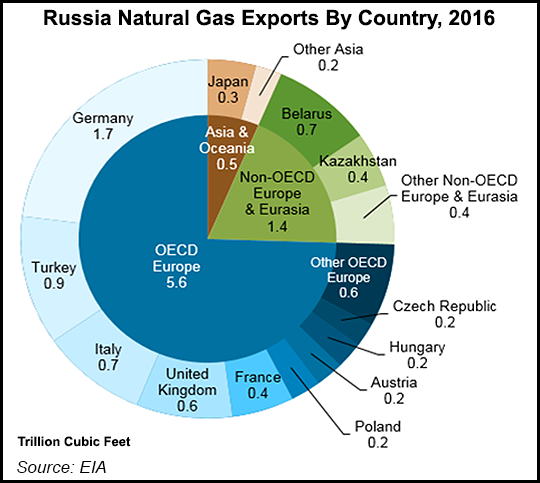Regulatory | LNG | Markets | NGI All News Access
Wyoming’s Barrasso Proposes Accelerating Natural Gas Exports to NATO Countries
A bill introduced in the Senate Wednesday would give North Atlantic Treaty Organization (NATO) member countries “an escape from Russia’s political coercion and manipulation,” in part by speeding approvals of U.S. natural gas exports, according to Sen. John Barrasso (R-WY).

The Energy Security Cooperation with Allied Partners in Europe Act (ESCAPE Act) would enhance the energy security of NATO members by providing them with American energy, and would mandate sanctions on the Nord Stream II natural gas pipeline and other Russian energy export pipelines.
The bill was prompted in part by the potential for Germany to increase imports of Russian natural gas through the proposed Nord Stream II pipeline, Barrasso said. Russia is already the largest gas provider in Europe, and Nord Stream II would only increase its influence, he said.
“When one country allows another aggressive, opportunistic country like Russia to have that kind of influence over its energy security, it’s asking for trouble,” Barrasso said. “Germany seems to be betting that increasing its economic ties to the Kremlin will have no effect on the political manipulations that Russia wants to play on Europe. It’s a sucker’s bet.”
In addition to requiring the Secretary of Energy to speed up approvals of liquefied natural gas (LNG) exports to NATO allies and other countries, the ESCAPE Act would authorize mandatory U.S. sanctions on the development of Russian energy pipelines, direct U.S. representatives at NATO to work to achieve energy security for allies in Europe and Eurasia, and call for a comprehensive strategy to increase U.S. energy exports “to these countries that are being held hostage by Russia.”
During a recent meeting with NATO officials, President Trump said Germany “is totally controlled by Russia because they will be getting from 60-70% of their energy from Russia,” and called the Russian pipeline “a very bad thing for NATO.” Nord Stream II, he said, would make “Germany a captive of Russia.”
Trump later appeared to backtrack from those comments, claiming that the United States would compete against the proposed pipeline with LNG exports.
After Russia invaded Ukraine in 2014 and annexed Crimea, the United States and its allies sanctioned some Russian energy companies and executives. The sanctions, coupled with burgeoning U.S. gas supplies, have opened the door to more LNG imports to the continent.
Last March, Germany granted authorization for the Nord Stream 2 pipeline, which would have 1.94 Tcf (55 bcm) of transport capacity, and run 1,222 kilometers (759 miles) under the Baltic Sea. The pipeline would connect the Russian port of Ust-Luga, near St. Petersburg, to Greifswald in northeast Germany. Nord Stream is expected to enter service in 2019.
Several Eastern European countries, including Poland, are opposed to the pipeline, and the Trump administration has promised to work with the continent to help diversify its energy supply.
© 2024 Natural Gas Intelligence. All rights reserved.
ISSN © 1532-1231 | ISSN © 2577-9877 |
